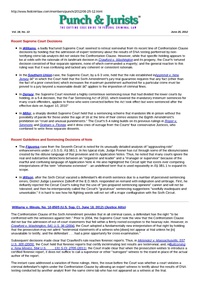Loaded on
June 25, 2012
published in Punch and Jurists
June 25, 2012
In a decision that both solidifies and extends the rule established in Apprendi v. New Jersey, 530 U.S. 466 (2000), the Court held, by a 6-3 vote, that the Sixth Amendment’s jury-trial guarantee requires that any fact (other than the fact of a prior conviction) which increases the maximum …
Loaded on
June 25, 2012
published in Punch and Jurists
June 25, 2012
This case is noted for its unusually detailed analysis of “aggravating role” enhancements under U.S.S.G. § 3B1.1, and particularly its analysis of the lack of substantive distinctions between an “organizer and leader” and a “manager or supervisor”.
This decision is noted for its timely and helpful review of …
Loaded on
June 25, 2012
published in Punch and Jurists
June 25, 2012
In U.S. v. Wilson, 614 F.3d 219, 224 (6th Cir. July 19, 2010) (“Wilson 1") (P&J, 11/08/10), the Sixth Circuit vacated a 48 month sentence imposed on the defendant, Lashawn Wilson, who pled guilty to a single count of mail fraud, after concluding that, but for the district court’s …
Loaded on
June 25, 2012
published in Punch and Jurists
June 25, 2012
In these two consolidated cases, the Court held, by a 5-4 vote, that “the Eighth Amendment forbids a sentencing scheme that mandates life in prison without possibility of parole for juvenile offenders.” In both cases, one from Alabama and one from Arkansas, a 14-year-old was convicted of murder and …
Loaded on
June 25, 2012
published in Punch and Jurists
June 25, 2012
The Confrontation Clause of the Sixth Amendment provides that in all criminal cases, a defendant has the right “to be confronted with the witnesses against him.” Prior to 2004, the Supreme Court took the view that the Confrontation Clause did not bar the admission of out-of-court statements that fell …
Loaded on
June 25, 2012
published in Punch and Jurists
June 25, 2012
In 2010, after some three decades of debate and controversy over the inherent unfairness of the Federal crack cocaine sentencing laws, Congress finally enacted the Fair Sentencing Act of 2010 (“FSA”) (Pub.L. No. 111–220, 124 Stat 2372). The FSA, which was signed into law on August 10, 2010, was …
